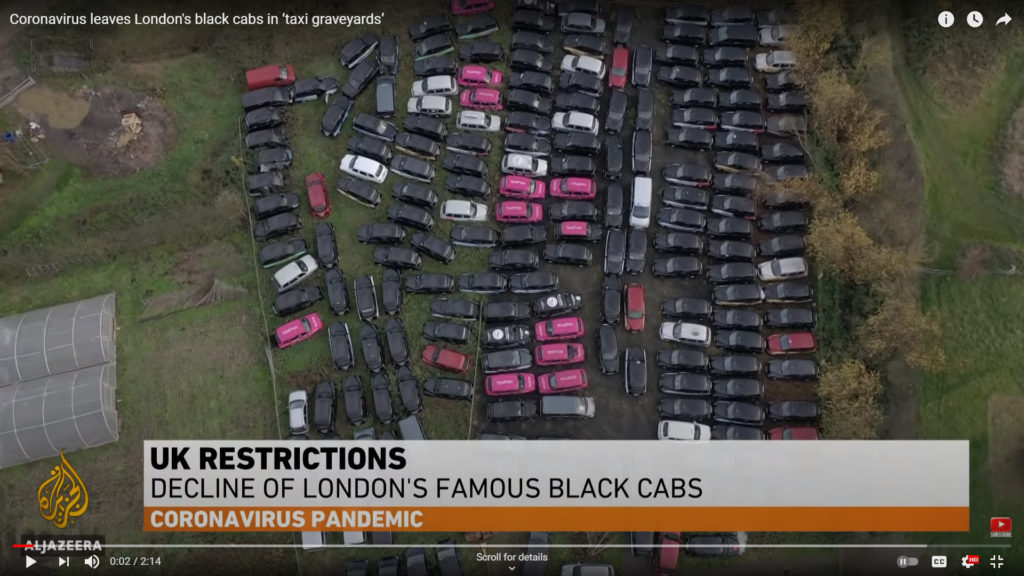Image: Al Jazeera English
At the height of the pandemic a small patch of land in Epping, Essex, became a visual representation of how just how severely our beloved city had been affected. The stark image of a ‘taxi graveyard’, hundreds of London cabs gridlocked in a field, unrented and long unused made the impact of coronavirus incredibly apparent.
These cabs, once seen whizzing through town, continue to sit patiently waiting for the emergence of a post-covid world. Simon Georgiou, director of black cab rental company GB taxi services, recalled the horror he experienced when, one by one, cabbies called to tell him the bad news. He said, “The phones just kept going, the emails were coming through basically telling us ‘we need to hand the cab back, because there is just not enough work out there”.
One driver said “Say I take a job in the morning, and it’s going to the West End or going to Paddington station, I can literally drive all the way back to Bethnal Green without a hand going up.”
Georgiou said ‘I think it is busier on a Christmas Day in London than what it has been the last six months.’ A shocking image and state of affairs.
Black Cab Numbers Still Don’t Make Pretty Reading
Unsurprisingly, with the full repeal of Covid restrictions still two months away and remote working being the Government’s preferred mode of operation for businesses, the latest data by TFL on the number of licensed black cab vehicles in London continues to show a drop of over 5,000 since the pandemic began. This brings the overall number down from 18,504 to 13,423. This is the most dramatic decline in these numbers since records began.
The LTDA (London taxi drivers association) conducted a survey with a worrying overall response. Of the 1,104 cabbies that took part, 99.8% said their income had been affected by the pandemic. 25.5% of those said they currently had no income at all from driving a taxi due to the pandemic, and 34.8% said they were earning 20% or less of their regular income.
79% were receiving financial support from the Government SEISS (Self-Employment Income Support Scheme). Of these drivers, 87% said the grants they receive are insufficient to cover their living and business expenses.
There’ll Be Less Competition For Black Cab Drivers
Optimistic cabbies looking to work after the pandemic could say there will be less competition for jobs than before. This is undoubtedly true. For private-hire operators the story isn’t any better. Currently 17,183 less private-hire vehicles are licensed than before the pandemic.
Naturally, the story isn’t unique to London or the cab trade. Transport firms the world over have been left reeling. Hong Kong is the globe’s leading tourist city, having welcomed 56 million visitors in 2019. Yet, the city has banned all non-residents from visiting since February, and pictures showing hundreds of empty tour buses filling up a port also went viral recently.
A Tragedy For A Historic Industry That Was Finally Gaining New Ground
We all know how the introduction of ride-sharing apps like Uber have affected the black cab trade, but things seemed to be looking up just before the pandemic. Taxi drivers in Britain’s capital have invested over 240m in electric cabs since 2018, as the industry looked to go green. Some cab drivers called it a ‘renaissance’, with people again recognising that cab drivers offer a genuinely unparalleled premium quality service.
There are now fears that these environmentally-friendly vehicles will be taken out of the industry en masse, as drivers face mounting costs without a steady income.
What Are The Government Doing To Help?
Taxi and private-hire drivers in Scotland, Wales and Northern Ireland have received support grants worth around £6,000. In London, our beloved cabbies have not received anything of the sort.
One cab driver told Sky News that “Liverpool put something in place, Manchester’s Andy Burnham is trying to put help in place for the cab drivers up in Manchester. Sadiq Khan has done nothing.”
The Government appear to be relying on local authorities to allocate additional restrictions grants (ARGs), but it seems that insufficient funds are reaching drivers. From listening to drivers its clear more needs to be done over and above the SEISS to help support the London cab trade.
The industry as a whole must come together to urge the powers that be to take appropriate action, sooner rather than later. Hopefully cab numbers will be in a position to return once lockdown measures are entirely eased and drivers won’t be lost to the trade for good.
Plan Insurance have 30 years experience providing black cab insurance to private hire drivers in the UK.


